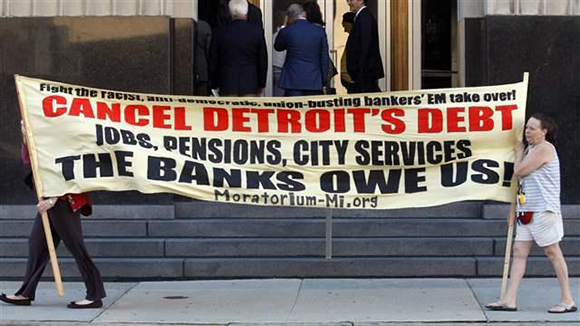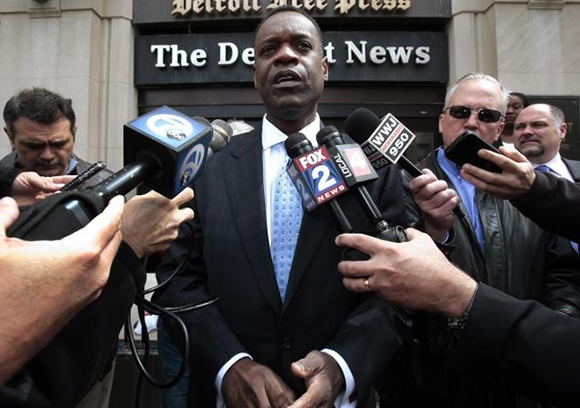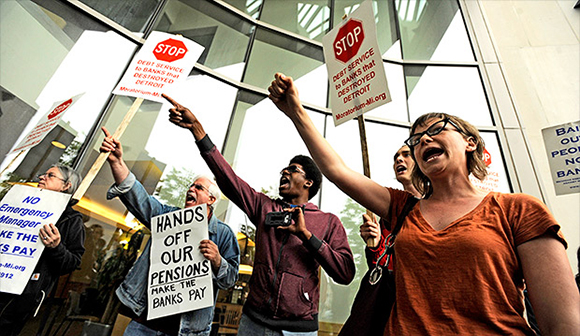by Dianne Feeley
December 5, 2013
The fix was in from the beginning – that’s pretty much what U.S. Bankruptcy Judge Steven Rhodes announced in his December 3 ruling that gives state-appointed Detroit Emergency Manager Kevyn Orr the green light to take the city into bankruptcy. Even while chiding Orr’s lack of “good faith” in the negotiations with unions and other creditors before filing for bankruptcy last July, Rhodes agrees with Orr’s claim that the city no longer has the resources to provide basic services. That (alleged) reality trumps the Michigan Constitution guaranteeing the integrity of public workers’ pensions, the city’s control of its assets, the dubious legality of the Emergency Manager law itself, and all other considerations. Detroit, the judge mused, should have filed bankruptcy years earlier.

The bankruptcy procees, Rhodes further ruled, will proceed without interruption while his decision is appealed. Next Orr will develop a “plan of adjustment” by early 2014 and reopen negotiations with those who are expected to take a haircut. In reducing those obligations, Orr would supposedly free up that money to rebuild the city’s deteriorating infrastructure. Millions are already being used to pay consultants for their restructuring proposals, including Orr’s own former law firm Jones Day.
Rhodes would then approve or modify the results sometime in late spring or early summer of 2014. While stating that Chapter 9 of the federal bankruptcy law permits the raiding of pension funds despite the state’s constitutional ban on doing so, he announced that he would not necessarily “rubber stamp” Orr’s plan. The big question for the shock-doctrine restructurers may be how far pensions can be cut for retired city workers – many of whom barely get by as it is, and in the case of uniformed personnel (fire and police) do not collect Social Security – without the risk of a political or social explosion.

Detroit’s “Emergency Manager” Kevyn Orr. Photo by Rebecca Cook, Reuters.
Even if the pensions of city workers are only slightly trimmed rather than stolen outright, Rhodes’ decision sets a frightening precedent for state workers in Michigan. Other states, such as Illinois, also have constitutional guarantees that can now be overrun if the decision were to stand.
When the full text of Rhodes’ 140-page opinion is released within a day, it will lay out the objections to the bankruptcy eligibility and refute them. Rhodes agrees with Orr’s assessment that the city owes $18.5 billion in long-term debt, of which $3.5 billion is for retiree pensions and $5.7 billion for retiree health care. Of course workers have contributed to the pension plan, and the city has put aside money for both over the years. (Orr, however, skipped the city’s 2013 contribution.)
Also counted in the debt is $5.7 billion for Metro Detroit’s water and sewerage bill, even though that debt is considered a “secured” debt, completely covered by user fees.

Photo by David Guralnick.
One might wonder why long-term debt features so prominently in the discussion. After all, most homeowners have a long-term debt (their mortgage) but don’t count that total amount when they are figuring up their yearly cash flow. One might also wonder why the banks–who have stiffed the city with huge fees, variable interest rates and taken advantage of lowered bond ratings to jack up interest–are not castigated for their role. But the banks are first in line for repayment, under the pretext that their loans are properly “secured” through pledged tax revenues. Orr has stated that secured loans would be paid in full.
To understand the politics behind this bankruptcy one has to understand the essence of capitalism. It is the expropriation of assets — land, nature’s resources and workers’ capacity to produce — that produces wealth. Detroit’s assets are on the chopping block. After so many years of corporate downsizing and relocation, after so many years of renovating the downtown at the expense of the neighborhoods, this is a deepening austerity. The pillage is on.
Dianne Feeley is a retired autoworker in Detroit, and a member of Solidarity. You can listen to a radio interview with her about the Detroit bankruptcy here, and her article “Which Way Out for Detroit?” was published in the latest issue of Against the Current.
